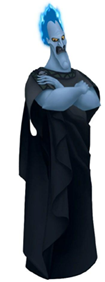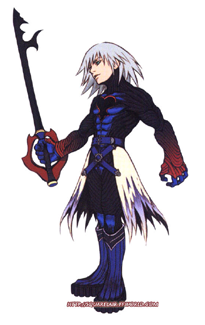The Villains Edition Part III: Absolute Corruption
 Several weeks ago, we showcased who we thought made poor and unreliable villains in Kingdom Hearts. Amongst those named, we included: Pete, the blundering fool; Demyx, the musical talent without much motive; Scar, a misplaced Disney icon; and Shan Yu, the silent but boring antagonist. But it would be a mistake to think that the darkness is commanded solely by these weak villains. Behind every pawn, there is a more devious hand that deals the cards. Continuing the Villains series, this week, we continue to speak more evil, hear more evil, and maybe even do more evil.
Several weeks ago, we showcased who we thought made poor and unreliable villains in Kingdom Hearts. Amongst those named, we included: Pete, the blundering fool; Demyx, the musical talent without much motive; Scar, a misplaced Disney icon; and Shan Yu, the silent but boring antagonist. But it would be a mistake to think that the darkness is commanded solely by these weak villains. Behind every pawn, there is a more devious hand that deals the cards. Continuing the Villains series, this week, we continue to speak more evil, hear more evil, and maybe even do more evil.
Beyond the Realm of Good and Evil
He’s your lifelong buddy, your comrade-in-arms and a fellow savior of the lands; Riku is a Keyblade wielder, perhaps soon to be a Keyblade master who has sacrificed himself to save your skin during Kingdom Hearts 2. But in KH1, Riku was the biggest prick possible. Despite having been originally chosen to wield the Keyblade (Sora was an alternate candidate), Riku defected to the darkness and escalated the conflict with the queen of evil, Maleficent. I realized it from the first meeting with Riku in Traverse Town (did it not seem odd that your best friend would not come with you to search for the other best friend?), but it took Sora forever to recognize the truth: Riku was a traitor. Then again, Sora was innocent and young, so it is completely understandable, but I was older and recognized deception lurking beneath the surface. I hated Riku.
Of course, a personal dislike forms no good basis to name Riku a villain. So let’s count the ways of his villainy. First, he tried to kill you. He was good at it, too. At the hardest difficulty mode, you cannot hope to defeat him without strategy, especially when you encountered Riku at his most formidable–Riku II as you saw him at Hollow Bastion. Riku could parry your attacks, channel dark powers, and swipe at you in multiple strokes that quickly bled your HP bar. He was more difficult to defeat than Maleficent—and that’s saying something. Riku was already a challenge back on Destiny Islands, yet he became almost the ultimate challenge as a villain in KH1. Unlike Demyx, Riku relied on no cheap tricks (eg. time attack or endless geyser rushes) so Riku was legitimately skilled and difficult. No wonder Maleficient prized him as her most valuable asset.
As we’ve seen in the previous Villains Special, a worthy bad guy knows your weaknesses and takes advantage of them. It’s been a villain formula since the dawn of time: The Evil Queen of Snow White played on Snow White’s kindness with a poisoned apple, Sephiroth always knew just what to say to rankle Cloud’s spirits, and the Joker has a habit of taking civilians as hostages to force Batman’s hand. Riku had accomplished much during his days as a villain; each time, he pushed Sora into a more dangerous situation. He led Sora on a frustrating chase in Monstro, summoned the Anti-Sora on Captain Hook’s ship, and, finally, forced Sora to navigate the heart of Maleficent’s stronghold without a weapon–a dangerous task indeed. Riku took Kairi as a hostage once he found her (the circumstances were definitely hostage-like if you think about it) and kidnapped Pinnochio as well. Riku sunk to what other central villains in KH1 lacked the ability to do—he could unlock and steal hearts, making him an irreplaceable part of Maleficent’s arsenal. Thus, we learn that the most effective villain is often those characters who were once no villain at all. For a prime example, look no further than Sephiroth–in Crisis Core, we saw that Sephiroth was a friend to the one of the protagonists previous to the events of FFVII.
“I hate it when they’re immortal”
…at least, I’m sure that’s what heroes say at least a few times in their lives. We turn the pages to a completely different brand of villainy—the immortal kind. What makes immortal villains tough to deal with is that they come back even after a seemingly tell-tale defeat. It wouldn’t matter very much if they came back in the same form and manner as the first time you met. Instead, they learn their mistakes and come back with new ways to challenge your skills, with greater insight into your weaknesses that they can take advantage of, and with renewed energy and desperation for revenge. There are a couple different picks for immortal villains, but this week, I give you Hades, Lord of the Undead.

No matter how many times you knock Hades down, he just keeps coming back. It’s a good think Hercules is superhuman; a normal hero would’ve died by now.
I can hear the outbursts now. Hades? Get real—the guy’s a pushover! Well, yes. Hades may spout dark fire from his hair and his arms can trap you in a wheel of fire with Hades in the center, but compared with the likes of Riku, Hades is easy to deal with on any mode of difficulty. Even the Lord of the Undead has an Achilles Heel, which players were apt to take advantage of during boss fights with Hades. But you don’t have to be ultra powerful to be a menacing threat. You only need your pawns to be ultra powerful. Like a smart villain, Hades hardly ever fights his own battles. It’s no small wonder, considering how limited his battle prowess is. Staying true to his Disney counterpart, KH Hades sees it more fit to employ the services of others to do his dirty work. He’s previously pitted the titans against Sora, and there was Cloud, of course, a very challenging opponent during KH1–it took a few tries to learn how to counter his pattern.
Being the Lord of the Underworld has its perks, however. Not only does Hades have an all-access pass to potentially powerful dead souls, he is also immune to being swallowed whole by the darkness. Hades uses the darkness as a power of influence rather than a power to conquer all odds. This is a smart move, because we’ve seen users of darkness lose their will before due to over-reliance. Hades plays to the tune of the darkness in a person’s heart and lulls it out of hiding. He is a master of cunningness and we first saw evidence of that in the tact he used to bring Cloud around to doing his bidding. A character only has to possess doubt and darkness to be lured by Hades. Hades is like a shadowy dealer with a knack for giving you bad bargains, where it’s not immediately apparent that you got the short end of the stick. Don’t let that grin and easy attitude deceive you—there’s more there than what meets the eye.
Sometimes Hades goofs up, such as when he failed to bring Auron to his side, but he’s immortal, so he can afford to goof up. Hades has a millennium to plan and achieve his goals, so if he learns from his mistakes every time, then it’s only going to become harder and harder to stop him.
 Sakuchan: I thought that maybe it would be controversial to re-introduce Riku as a villain. I did it anyways because Riku is such a great example of how people feel differently about opponents they face. I suppose the more you fear or despise someone, the better a villain they must be! There are two more super evil villains coming up! Can you guess who they might be?
Sakuchan: I thought that maybe it would be controversial to re-introduce Riku as a villain. I did it anyways because Riku is such a great example of how people feel differently about opponents they face. I suppose the more you fear or despise someone, the better a villain they must be! There are two more super evil villains coming up! Can you guess who they might be?







